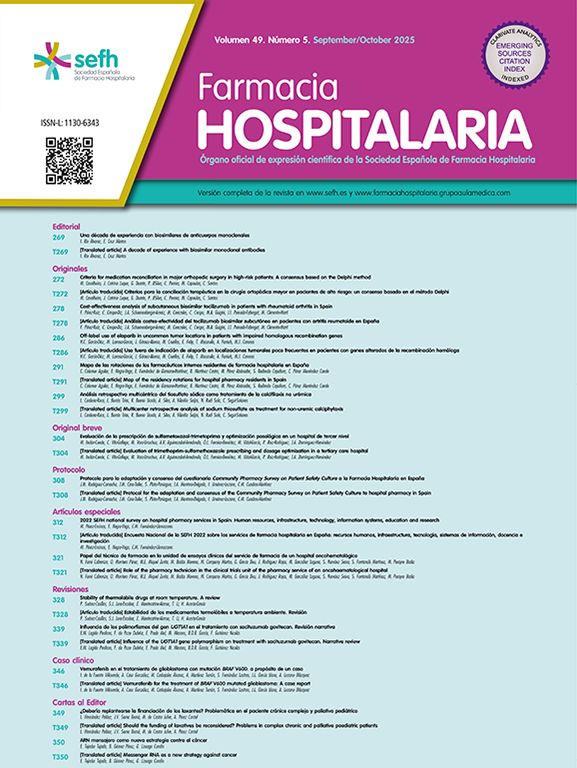The objective is to assess a pharmaceutical care programme for heart transplant patients upon patient admission and discharge.
Material and methodsObservational study of heart transplant patients, performed during the first quarter of 2007. Upon admission, the patient was interviewed regarding home treatments, adherence, allergies, and adverse effects, his/her prescriptions were compared with the last discharge report (drug reconciliation). At time of discharge, treatment was checked against the last hospital prescription (reconciliation) and an informative report was drawn up and personally delivered to the patient. Subsequently, a satisfaction questionnaire was carried out by telephone. Drug-related problems were recorded using Atefarm® software.
ResultsThe programme was applied to 24 patients upon admission and 23 upon discharge. No drug interactions were detected. Treatment adherence was higher than 90%. 37.5% of patients informed of an adverse reaction. Medication-related problems were identified in 16 patients (45.7%) for 6.6% of medications, most of which (38%) were for infection prophylaxis; medication omission was the most frequently-detected error. Positive evaluation of the information that was received was higher than 90%.
ConclusionsPharmacotherapeutic follow-up upon admission and discharge resolves and prevents problems while improving patienti nformedness and satisfaction. Limitations on personnel prevent the population's requests from being met.
El objetivo es evaluar un programa de atención farmacéutica al ingreso y al alta hospitalaria del paciente trasplantado cardíaco.
Material y métodosEstudio observacional realizado el primer trimestre de 2007 en pacientes trasplantados cardíacos. Al ingreso, se entrevistó al paciente sobre tratamientos domiciliarios, adherencia, alergias, efectos adversos, y se comparó la prescripción con el último informe de alta (conciliación). Al alta, se comparó el tratamiento con la última prescripción hospitalaria (conciliación) y se elaboró un boletín informativo, entregándolo personalmente al paciente. Posteriormente, se realizó un cuestionario telefónico sobre satisfacción. Los problemas relacionados con los medicamentos (PRM) fueron registrados en la aplicación Atefarm®.
ResultadosEl programa al ingreso se aplicó a 24 pacientes y al alta a 23. No se detectaron interacciones. La adherencia al tratamiento fue superior al 90%. El 37,5% de los pacientes comunicó alguna reacción adversa. Se identificaron PRM en 16 pacientes (45,7%), en un 6,6% de los medicamentos, la mayoría (38%) pertenecientes a profilaxis infecciosa, siendo la omisión del medicamento el error principalmente detectado. La valoración positiva de la información recibida superó el 90%.
ConclusionesEl seguimiento farmacoterapéutico al ingreso y al alta resuelve y previene problemas y favorece la información y satisfacción del paciente. Las limitaciones de personal impiden cumplir las demandas de la población.
Introductory statement: The results were partially presented in a poster at the LII Congreso Nacional de la Sociedad Española de Farmacia Hospitalaria, held in Tenerife on 25-28 September 2007.





